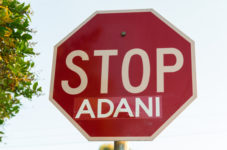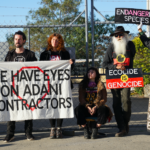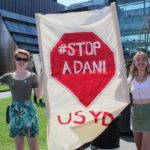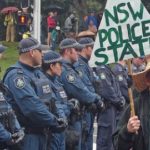The Offence of Aggravated Unlawful Entry on Inclosed Lands in NSW

NSW agriculture minister Adam Marshall announced in a press release on 31 January that the first two people had been charged with the offence aggravated trespass on inclosed lands since the penalties that apply to the crime in relation to animal rights activists were beefed up in November.
According to the minister, the pair – who were dressed in balaclavas and camouflage gear – were arrested for illegal farm trespass over a “midnight invasion” of a NSW property, which involved multiple participants and was designed to disrupt the farmer’s business.
The “vigilantes” had allegedly snuck onto the rural property on a number of occasions over the month of January, and the farmer had even gone as far as to hire a private security guard to deal with the trespassing incidents.
“This is exactly the type of disgusting behaviour that the Right to Farm laws were designed to capture,” the minister remarked in his statement. “These people clearly had no intention of engaging in lawful peaceful protest” when they snuck “onto a farm in the dark dressed like a thug.”
However, with the NSW Liberal Nationals government’s relentless attack on the right to protest over the last decade, one might be hard pressed to find just what sort of “lawful peaceful protest” the agriculture minister was actually referring to.
On agricultural land
The two unidentified animal rights protesters were charged with the offence of aggravated unlawful entry on inclosed lands, contrary to section 4B of the Inclosed Lands Protection Act 1901 (NSW) (the Act).
Prior to the passing of the Right to Farm Bill 2019 (NSW), there were already a number of examples under subsection 4B(1) of the Act that could capture aggravated illegal farm entry, however two new subsections – “(h) damages property on agricultural land” and “(i) wilfully or negligently releases any livestock” – were added.
The Right to Farm Bill also added a definition of “agricultural land” to section 3 of the Act, which includes farms or any other business relating to agriculture, livestock businesses, slaughterhouses and related enterprises, as well as forestry or aquaculture businesses.
The passing of the Right to Farm Bill also resulted in new maximum penalties in section 4B that apply specifically to “an offence that occurs on agricultural land”.
An individual convicted of aggravated trespass on agricultural land is liable to up to 12 months prison time and/or a fine of $13,200. However, if the offender was in the company of two or more people, or seriously risked any person’s life, they face up to 3 years behind bars and/or a fine of $22,000.
Rural crimes
This is not the first time section 4B has been broadened in scope. In October 2017, then primary industries minister Niall Blair introduced the Rural Crime Legislation Amendment Bill 2017 (NSW) into the NSW Legislative Council.
Minister Blair told the chamber in his second reading speech on the bill that it altered section 4B as “to better reflect the impact of trespass and illegal hunting on rural properties”. And new subsections (1)(c) through to (g) covered biosecurity impacts, hunting or animal theft, firearm possession and being accompanied by a hunting dog.
Passed on 15 November 2017, the amendment legislation inserted subsection (1)(c) into the offence of aggravated unlawful trespass, which involves activity that “introduces or increases a risk of a biosecurity impact (within the meaning of the Biosecurity Act 2015) for those inclosed lands”.
Section 13 of the Biosecurity Act 2015 (NSW) defines a biosecurity impact as “an adverse effect on the economy, the environment or the community that arises, or has the potential to arise, from biosecurity matter, a carrier or dealing with biosecurity matter or a carrier”.
The NSW Animal Justice Party told Sydney Criminal Lawyers in July 2017 that as the legislation defines a “carrier” to include humans and inanimate objects, then these laws can be applied to activists trespassing on farms – along with their film equipment – if they potentially pose a risk.
And for all of the new circumstances that were added to aggravated trespass in 2017, the previously standing maximum penalty of a $5,500 fine applied, and still does.
Fossil fuel protections
Then premier Mike Baird first hinted that he’d be targeting “protesters who unlawfully enter mining sites” at a NSW mining industry dinner in November 2014. And he followed through with the Inclosed Lands, Crimes and Law Enforcement Legislation Amendment (Interference) Bill 2016.
The heavily criticised suite of anti-protest laws that were contained within the bill included the initial version of section 4B. And the legislation also broadened the definition of a mine under the Crimes Act 1900 (NSW), so that the offence of interfering with a mine also applies to coal seam gas sites.
The new aggravated illegal entry law was widely condemned for increasing the penalty that applied to trespass on inclosed lands by tenfold: up from the $500 incurred for unlawful entry on inclosed lands under section 4 of the Act to $5,500 when the trespass is found to be aggravated.
When the bill was passed on 16 March 2016, the offence of aggravated unlawful entry on inclosed lands applied to circumstances where a person either “interferes with, or attempts or intends to interfere with, the conduct of the business or undertaking” or “does anything that gives rise to a serious risk to the safety of the person or any other person on those lands”.
And when it comes to these trespass laws, the ridiculously broad definition of inclosed lands within the Act has also raised eyebrows, as it includes “any land, either public or private, inclosed or surrounded by any fence, wall or other erection, or partly by a fence, wall or other erection”, as well as buildings.
A failed attempt
Although, a recent case revealed that this broad definition doesn’t cover all circumstances. Anti-coal protester Micah Weekes appeared in Newcastle Local Court on 10 December last year, over an incident last September that saw him blocking the passage of a coal train by climbing on top of it.
While Weekes was found guilty of stopping a train and obstructing a railway, he saw this outcome as a victory as he skipped prison time and instead received a good behaviour bond and an $800 fine. And on top of this, his legal team was able to have a charge of aggravated unlawful entry on inclosed lands dropped.
The former coal miner explained that his lawyers argued that the legislation states that there should be “some sort of recognisable boundaries”, such as “a fence or wall or bordered by a natural feature, like a river”.
But, the prosecution failed to prove that the area where Mr Weekes had climbed atop the train was “enclosed space”. And hence, he hadn’t unlawfully entered inclosed land.








